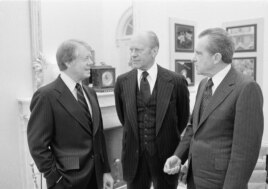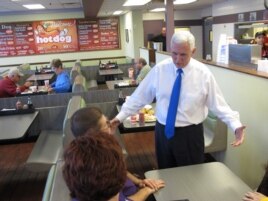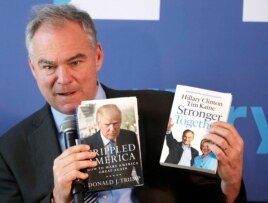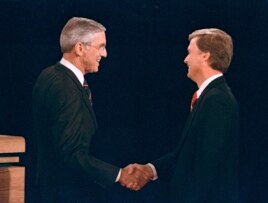02 October, 2016
Democrat Tim Kaine and Republican Mike Pence are running for vice president. They will compete in a televised debate Tuesday night.
Vice president is a position that has long been the object of jokes because many saw it as an unimportant job.
The vice presidency has grown in importance. Recent vice presidents have been asked to do much more than represent the United States at funerals.
But for many years, even those who held the office said they had little to do.
‘Most Insignificant Ever'
John Adams was the first U.S. vice president, serving under George Washington. He said the vice presidency was the "most insignificant office" ever.
Thomas Marshall served as vice president from 1913 to 1921. He joked: "Once there were two brothers. One ran away to sea; the other was elected vice president of the United States. And nothing was heard of either of them again."
Walter Mondale, who was Jimmy Carter's vice president from 1977 to 1981, said that "over most of America's history, the vice president has been standby equipment." By standby, he meant that the vice president stands by, ready to become president if the president dies or gives up the office.
That has happened nine times -- eight because of the death of the president and once when the president gave up the office.
The last two vice presidents to take over the presidency were Lyndon Johnson and Gerald Ford. Johnson took the oath of office after President John F. Kennedy was assassinated in 1963. Ford replaced President Richard Nixon after he resigned in 1974 as Congress investigated a scandal known as Watergate.

President Jimmy Carter, left, with Gerald Ford and Richard Nixon
Mourner in Chief
Joel Goldstein is a law professor at the University of St. Louis in the state of Missouri. He is considered one of the top experts on the vice presidency.
He said the vice presidency was long connected to representing the United States at funerals and casting the deciding vote in the Senate when a vote was tied.
But that changed, beginning with Richard Nixon, who served as vice president for Dwight Eisenhower in the 1950s.
Eisenhower sent Nixon to meet with foreign leaders, Goldstein said. A Nixon visit to the Soviet Union led to a debate with Russian Premier Nikita Khrushchev over which is better: capitalism or communism.
Nixon, a Republican, went on to run and lose the presidential election to Democrat John Kennedy in 1960.
Eight years later, Nixon won the presidency, defeating another vice president, Democrat Hubert Humphrey.
Office Grows under Mondale
Goldstein said Walter Mondale expanded the importance of the vice presidency. He acted as an important adviser to President Jimmy Carter from 1977 to 1981.
Mondale, a Democrat, started a tradition that future administrations copied. He started weekly lunches between the president and vice president to discuss top issues, Goldstein said.
George H.W. Bush served as Ronald Reagan's vice president. He helped move Reagan's agenda through Congress, Goldstein said.
Bush also helped persuade Reagan to negotiate nuclear weapons reduction with Russian President Mikhail Gorbachev. Bush, a Republican, won the presidency over Democrat Michael Dukakis in 1988.
From 2001 to 2009, Dick Cheney served as vice president to President George W. Bush. George W. Bush is a Republican, like his father, George H.W. Bush.
Reuters said Cheney played a big part in the Bush administration's decision to invade Iraq. George H.W. Bush, in a book, said that Cheney pushed too hard for war.
Current Vice President Joe Biden has also been a top adviser to President Barack Obama. Biden said he attends almost every meeting with Obama, "at his request." He has led White House efforts to pass gun control bills and to fight cancer.
"One of the finest vice presidents in history" is what Obama said of Biden on CBS Television.
Vice Presidential Candidates Are Part of a Ticket
People do not vote directly for the vice president. They vote for what is called a "ticket."
On November 8, voters will choose between the Republican ticket of presidential candidate Donald Trump and Vice Presidential candidate Mike Pence and the Democratic ticket of Hillary Clinton and Tim Kaine.

Mike Pence campaigning
At Tuesday night's debate, Pence and Kaine are likely to spend a good deal of the 90-minute debate talking about their partner on the ticket.
They will explain why their running mate would make a good president and why the other presidential candidate would not.

Tim Kaine campaigning.
Goldstein, the University of St. Louis expert, said vice presidential debates generally get less attention than the three debates between the major presidential candidates.
But there was one big exception. The 2008 vice presidential debate between Democrat Joe Biden and Republican Sarah Palin drew 70 million viewers. That is more than the number of people who watched the first presidential debate between Barack Obama and John McCain.
The most remembered moment in a vice presidential debate was in 1988, Goldstein said. That was the debate between Republican vice presidential candidate Dan Quayle and Democrat Lloyd Bentsen.
After Quayle compared his experience to that of former President John Kennedy, Bentsen responded this way:
"Senator, I served with Jack Kennedy. I knew Jack Kennedy. Jack Kennedy was a friend of mine. Senator, you are no Jack Kennedy."

Lloyd Bentsen, left, and Dan Qualye at 1988 vice presidential debate.
Bentsen's line was the most quoted in news reports of the debate. But the Republican ticket of George H.W. Bush and Quayle defeated the Democratic ticket of Michael Dukakis and Bentsen that year.
I'm Bruce Alpert.
Bruce Alpert reported this story for VOA Learning English. Mario Ritter was the editor.
We want to hear from you. Write to us in the Comments Section and share your views on 51VOA.COM.
________________________________________________________
Words in this Story
insignificant –adj. small or unimportant
standby –adj. ready or available to take over when needed
scandal –n. an occurrence in which people are shocked and upset because of behavior that is morally or legally wrong
ticket –n. candidates running together for elected office
agenda –n. things to be done, legislation supported by a political party or leader